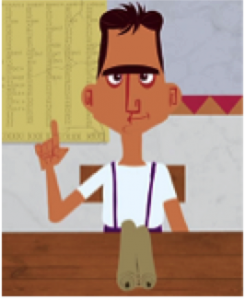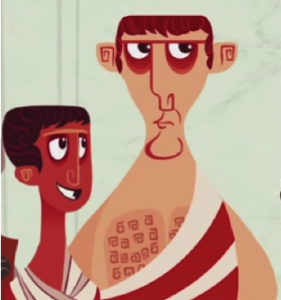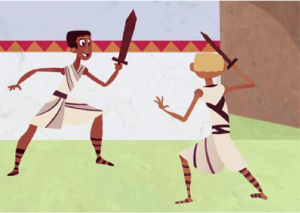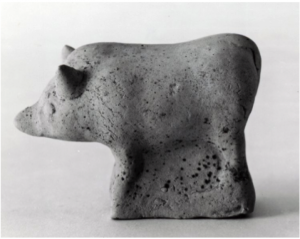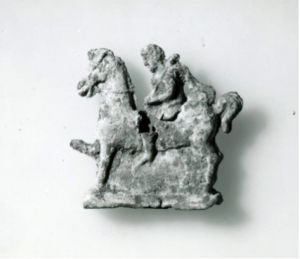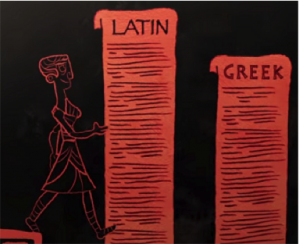In the two stories, Four Sisters in Ancient Rome and A Glimpse of Teenage Life in Ancient Rome, we have explored what daily life was life for a young Roman. What historians know of life in Rome comes from what was written down, by artefacts and inscriptions. What can you add to the stories of Roman children from the following extracts, images and inscriptions? Can you find similarities between your own childhood experience and theirs? What do you find is the greatest difference?
Contents
- Parenting advice
- Paediatric medicine
- Love of children
- Games
- School
Parenting Advice
Seneca, writing in the 1st century in Rome, and Plutarch in the 2nd century give advice to parents on how best to raise their children. Similar to modern parenting books and magazines, can you put their advice into your own words? Do you agree or disagree with their advice?
Seneca
It is extremely important that children should be brought up properly from the start, although training them is no easy matter. Although we should not restrict the development of their personality, they must not be allowed to have tantrums…Freedom that is unrestricted results in a character that is unbearable; total restriction leads to a servile character. A child will be encouraged to gain self-confidence by being praised; on the other hand too much praise makes him over-confident and irascible. We should follow the mean in bringing up children: sometimes the child must be held back, sometimes encouraged. He should not be humiliated or subjected to servile treatment. He must not be allowed to cry and ask for rewards, nor should such behaviour gain him anything; rewards should be given only if he has been good, or promises to be good. When he is competing with others of the same age, he should neither be allowed to give up or to lose his temper…if he wins a game or does something remarkable, he should be praised, but not to excess: for excessive pleasure leads to over-confidence, and over-confidence to pride. Children should be left some free time, but to get used to living an inactive and easy life… If a child has always been given everything he asked for, if his anxious mother always comforted him when he cried, if his childminder always let him do what he wanted, then he will never be able to cope with another unpleasant in life.
(Seneca, De Ira 2.21. 1-6, click for link)
Plutarch
Moreover, I have seen some parents whose too much love to their children has occasioned, in truth, they are not loving them at all. I will give light to this assertion by an example, to those who ask what it means. It is this: while they are over-hasty to advance their children in all sorts of learning beyond their equals, they set them too hard and laborious tasks, whereby they fall under discouragement; and this, with other inconveniences accompanying it, cause them in the issue to be ill affected to learning itself. For as plants by moderate watering are nourished, but with over-much moisture are glutted, so is the spirit improved by moderate labours, but overwhelmed by such as are excessive. We ought therefore to give children some time to take breath from their constant labours, considering that all human life is divided betwixt business and relaxation. To which purpose it is that we are inclined by nature not only to wake, but to sleep also; that as we have sometimes wars, so likewise at other times peace; so some foul, so other fair days; and, as we have seasons of important business, so also the vacation times of festivals. And, to contract all in a word, rest is the sauce of labour. Nor is it thus in living creatures only, but in things inanimate too. For even in bows and harps, we loosen their strings, that we may bend and wind them up again. Yes, it is universally seen that, as the body is maintained by repletion and evacuation, so is the mind by employment and relaxation.
(Plutarch, The Education of Children, 13, c. 110 AD, click for link)
Paediatric Medicine
Pliny
Hernia in infants is cured by letting a green lizard bite the child’s body while asleep, after which the lizard is attached to a reed, and hung up in the smoke; by the time the animal dies, the child will be perfectly cured, it is said. The slime of snails, applied to the eyes of children, straightens the eyelashes, and makes them grow ( Pliny HN 30.47 click for link)
For babies nothing is more beneficial than butter, either by itself or with honey, especially when they are troubled with teething, sore gums, or ulcerated mouth. The tooth of a wolf tied on as an amulet keeps away childish terrors and ailments due to teething, as does a piece of wolf’s skin … Hare’s rennet applied to the mother’s breasts checks the diarrhoea of babies. Ass’s liver mixed with a moderate amount of panaces and let drip into the mouth protects babies from epilepsy and other diseases; the treatment, it is prescribed, should continue for forty days. Ass’s hide laid on babies keeps them free from fears. The first teeth of horses to fall out make the cutting of teeth easy for babies who wear them as an amulet, a more efficacious one if the teeth have not touched the ground. Ox spleen in honey is administered internally and externally for painful spleen; for running sores with honey … a calf’s spleen boiled in wine, beaten up, and applied to little sores in the mouth.
(Pliny HN 28. 78, click for link)
Love of Children
Inscriptions:
- CIL 6.9731 (Rome, of unknown date)
Pieris, ornatrix, vixit an(nos) VIIII; Hilara mater posuit.
Pieris, hairdresser, lived 9 years ; Hilara, her mother, dedicated this to her.
- CIL 6.10078; ILS 5300 (Rome, of unknown date)
Florus ego hic iaceo bigarius infans qui, cito dum cupio currus, cito decidi ad umbr9as); Ianuarius alumno dulcissimo
I, Florus, lie here, a child driver of a two-horse chariot, who, while I wanted to race my chariot quickly, quickly fell to the shades; Ianuarius made this for his sweetest foster-child
- My little doll, my dear Mania, lies buried here. Just a few years was I able to give my love to her. Her father now weeps constantly for her; he has almost turned into an eternal lamentation himself. Once he held her in his arms and showed her to the edges of the sunlight. Thus he was able to lovingly hold his greatest hope and expectation.
In literature:
In the case of man, a rational and social animal, Nature, by introducing him to a conception of justice and law and to the worship of the gods and to the founding of cities and to human kindness, has furnished noble and beautiful and fruitful seeds of all these in the joy we have in our children and our love of them, emotions which accompany their first beginnings; and these qualities are found in the very constitution of their bodies.
(Plutarch, De Amore Prolis 3, click for link)
Games
In literature:
Horace describes some examples of children’s toys. Can you imagine what these toys looked like?
Children play with ‘baby-houses, …yoke mice to a go-cart, …play at odd and …ride upon a long cane’.
(Horace, 2.3.25, click for link)
Archaeological evidence of children’s toys:
Terracotta child’s rattle in the form of a pig, 1stC; Calabria (courtesy of the British Museum)
Lead figure of a horse and rider, toy; figure; Roman; 1stC-3rdC (courtesy of the British Museum, Click for link)
School
Martial
Sir Schoolmaster—show pity upon your simple scholars, at least if you wish to have many a long-haired boy attendant upon your lectures, and the class seated around your critical table love you. Then would no teacher of arithmetic or swift writing have a greater ring of pupils around him. Hot and bright are the days now under the flaming constellation of the lion; and fervid July is ripening the bursting harvest. So let your Scythian scourge with its dreadful thongs, such as flogged Marsyas of Celaenae, and your formidable cane—the schoolmaster’s scepter—be laid aside, and sleep until the Ides of October. Surely in summer time, if the boys keep their health, they do enough.
(Martial: Epigrams, X.62, first century A.D., click for link)
Plutarch
Yet I am not so unacquainted with differences of age, as to think that we should urge those of tender years severely, or exact a full complement of work from them; for it will be necessary, above all things, to take care lest the child should conceive a dislike to the application which he cannot yet love, and continue to dread the bitterness which he has once tasted, even beyond the years of infancy. Let his instruction be an amusement to him; let him be questioned and praised; and let him never feel pleased that he does not know a thing; and sometimes, if he is unwilling to learn, let another be taught before him, of whom he may be envious. Let him strive for victory now and then, and generally suppose that he gains it; and let his powers be called forth by rewards, such as that age prizes.
(Plutarch, The Education of Children 20, c. 110 AD, click for link)
Further Reading:
Bradley, Keith (2005) ‘The Roman Child in Sickness and in Health’ in The Roman Family in the Empire: Rome, Italy, and Beyond, Michele George (ed.), OUP, Oxford
Corbier, Mireille (2001) ‘Child Exposure and Abandonment’ in Childhood, Class and Kin in the Roman World, Suzanne Dixon (ed.), Routledge, London
Grubbs, Judith Evans; Tim Parkin; Roslynne Bell (eds.) (2013) The Oxford Handbook of Childhood and Education in the Classical World, Oxford University Press, Oxford
Laes, Christian (2006) Children in the Roman Empire: Outsiders Within, Cambridge University Press, Cambridge
Laurence, Ray; Harlow, Mary (2006) Growing Up and Growing Old in Ancient Rome: A Life Course Approach, Routledge, Oxon
Rawson, Beryl (2003) Children and Childhood in Roman Italy, OUP Oxford
